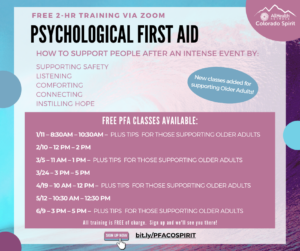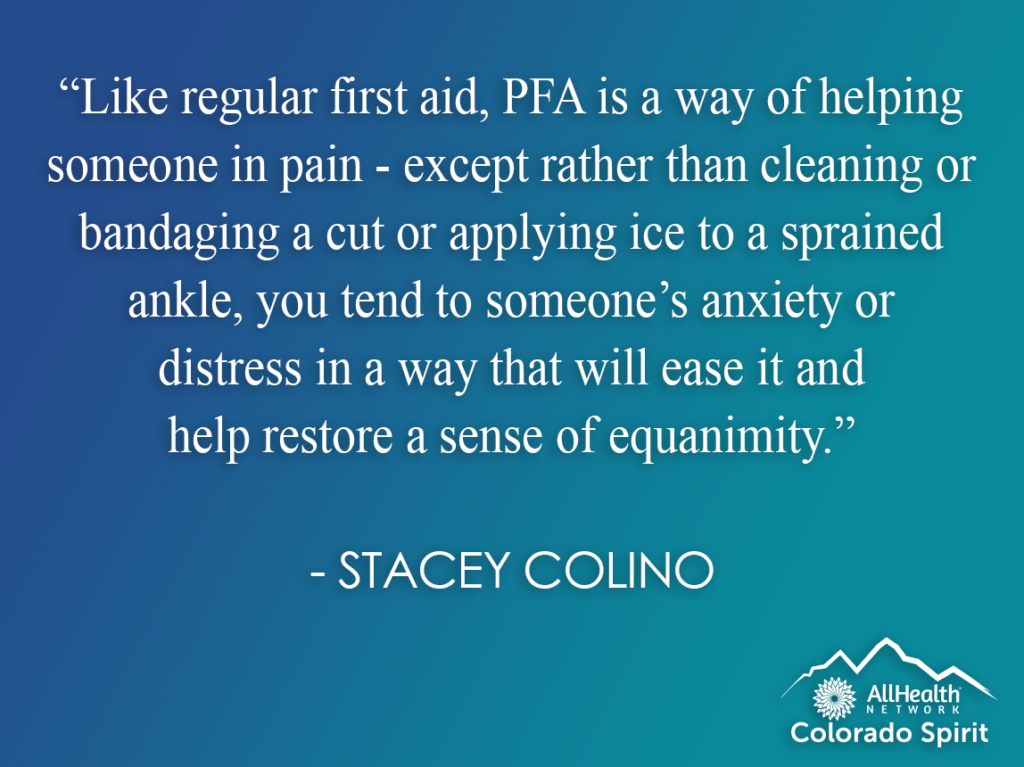Welcome to the Weekly Well-Being Connection! Each week we will share advice from our clinical experts on ways to care for your mental health and well-being throughout COVID-19.
These past few weeks, we have focused on the winter holiday season. This week, we want to shift a little and talk about a more general topic – Psychological First Aid (PFA).
So, What is PFA?
The National Childhood Traumatic Stress Network (NCTSN) explains that PFA is an evidence-informed approach to support people of all ages after a disaster. PFA assumes that people impacted by a disaster or traumatic event may face new challenges, and that certain core actions support all of us, as humans, in addressing these challenges. I like to think that PFA is a set of actions and supports that can help all of us tap into or enhance our resiliency. The beautiful thing about PFA is that the principles are supports for us all whether we are experiencing the disaster or we are folks responding to the disaster. These same core actions are supportive during times of high stress. The model I am trained in was developed by NCTSN and the National Center for PTSD and has 8 core actions outlined here .
PFA really is a 1st aid model
It is not treatment, and it is not something that only behavioral health professionals can do. In my experience, some of the most amazing “PFAers” are those who have no formal training in behavioral health. There are many different models of PFA or disaster behavioral health support, but at their core, they all have 5 things in common: addressing safety, engage in calming practices, building hope, being able to take action to help ourselves and others, and making social connection. With this frame, any of us are in a place to be a support to others and these same concepts can help us figure out what might feel supportive to us if we are feeling stressed and overwhelmed.
I have been a PFA trainer since 2017 and had taken my 1st PFA class many years before that, and I will admit that I spent a lot of time wondering why this model was something our state partners at the Colorado Department of Public Health and Environment (CDPHE) put so much time and effort into training the community on. I remember very clearly having a strong reaction when it was suggested that as a PFA trainer, I could take my training show on the road and train folks in public health, emergency management, and emergency response in this model. I remember thinking that with all these professionals have on their plates and all the training they already had, what good would PFA do? Wow…I was wrong!
After many years, I think I finally understand what my CDPHE supports have been so patiently trying to teach me! Over the years I have had the pleasure of connecting with various professionals and community members to talk about PFA concepts. I hear time and time again that understanding our body’s physiological stress reaction is crucial when we are connecting with others and recognizing that our ability to be a non-anxious presence in difficult times is incredibly impactful. It is an honor to be able to validate what many folks naturally do in difficult situations and give them the science behind why this is effective and offer some concrete tips to people who want to support others, but are not sure where to start.
Learn PFA yourself through our free programs
Right now we are all being pulled to be helpers and we all could use some support. Learning PFA and sharing it with your sphere of influence might be a way to help spread kindness and compassion this holiday season and beyond.
The Colorado Spirit team is offering FREE Brief 2-hour PFA training via Zoom. The training is in real time and has lots of space for questions and participation. Check out our calendar to find a date that works for you. Our team is also happy to bring this training to your workplace or community. Please reach out via phone, email, or our contact form on our website, and we will be happy to arrange something.
Also, for folks who really want to dive into PFA training, NCSTN offers a FREE online 6-hour version of PFA. This link will allow you to set up a free account and take a self-paced online course. NCTSN also provides FREE PFA resources in a variety of languages.
Would speaking to someone help?
To speak with someone in the Colorado Spirit Program about stress related to the pandemic, please call 720-707-6789 or visit our web page at www.allhealthnetwork.org/Colorado-Spirit
For information about other services at AllHealth Network or to get connected with ongoing behavioral health support, please call: 303-730-8858.
AllHealth Network is continuing to provide service via telehealth or by phone and our Crisis Walk-in Center remains open 24/7. To learn more about what other community mental health centers are doing, please visit The Colorado Behavioral Health Council COVID-19 website.
If you are experiencing a mental health crisis and are in need of immediate assistance, please call the Colorado Crisis Hotline at 1-844-493-TALK (8255) or text TALK to 38255

 Skip to content
Skip to content